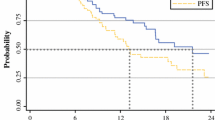Summary
Purpose: To evaluate the impact of flutamide on survival of patients with unresectable pancreatic cancer. Methods: This single institution, randomized, double-blind, placebo controlled study compared flutamide in the dose of 250 mg three times daily (n = 23) versus placebo (n = 23) in patients with histologically proven, previously untreated unresectable pancreatic adenocarcinoma. The primary end point was overall survival; secondary endpoints included 6-month and 1-year survival rates, performance status and response rate. Results: Both the groups were well matched with regards to demographic, disease related and treatment variables. This small sample sized study, failed to demonstrate a dramatic effect on survival with the use of flutamide. Median overall survival was 151 days with the use of flutamide as compared to 136 with placebo (p = 0.51). The 6-month survival rate was 39.13% in both arms of study and 1-year survival was 4.35% versus 13.04% for the flutamide group. There was no statistically significant difference in time to deterioration of performance status (flutamide 90 days versus placebo 68 days, p = 0.59) and all patients died as a result of tumor progression. Conclusions: Anti-androgen drug flutamide in the dose of 250 mg three times daily does not appear to prolong overall survival in unresectable pancreatic cancer.
Similar content being viewed by others
References
Corbishley TP, Iqbal MJ, Wilkinson ML, Williams R: Androgen receptor in human normal and malignant pancreatic tissue and cell lines. Cancer 57: 1992–1995, 1986
Greenway B, Duke D, Pym B, Iqbal MJ, Johnson PJ, Williams R: The control of human pancreatic adenocarcinoma xenografts in nude mice by hormone therapy. Br J Surg 69: 595–597, 1982
Greenway BA: Effect of flutamide on survival in patients with pancreatic cancer: results of a prospective, randomised, double blind, placebo controlled trial. Br Med J 316: 1935–1938, 1998
Wasan HS: Effect of flutamide on survival in patients with pancreatic cancer. No recommendations can be made. Br Med J 318: 327–328, 1999
Tonnesen K, Kamp-Jensen M: Antiestrogen therapy in pancreatic carcinoma: A preliminary report. Eur J Surg Oncol 12: 69–70, 1986
Wong A, Chan A, Arthur K: Tamoxifen therapy in unresectable adenocarcinoma of the pancreas. Cancer Treat Rep 71: 749–750, 1987
Keating JJ, Johnson PJ, Cochrane AM, Gazzard BG, Krasner N, Smith PM, Trewby PN, Wheeler P, Wilkinson SP, Williams R: A prospective randomised controlled trial of tamoxifen and cyproterone acetate in pancreatic carcinoma. Br J Cancer 60: 789–792, 1989
Bakkevold KE, Pettersen A, Arnesjo B, Espehaug B: Tamoxifen therapy in unresectable adenocarcinoma of the pancreas and the papilla of Vater. Br J Surg 77: 725–730, 1990
Taylor OM, Benson EA, McMahon MJ: Clinical trial of tamoxifen in patients with irresectable pancreatic adenocarcinoma. The Yorkshire Gastrointestinal Tumour Group. Br J Surg 80: 384–386, 1993
Greenway BA: Androgen receptor-blocking agents: potential role in pancreatic cancer. Drugs Aging 17: 161–163, 2000
Sharma JJ, Razvillas B, Stephens CD, Hilsenbeck SG, Sharma A, Rothenberg ML: Phase II study of flutamide as second line chemotherapy in patients with advanced pancreatic cancer. Invest New Drugs 15: 361–364, 1997
Corrie P, Mayer A, Shaw J, D’Ath S, Blagden S, Blesing C, Price P, Warner N: Phase II study to evaluate combining gemcitabine with flutamide in advanced pancreatic cancer patients. Br J Cancer 87: 716–719, 2002
Yamashita J, Abe M, Ogawa M: Endocrine therapy in pancreatic carcinoma. Oncology 55: 17–22, 1998
Targarona EM, Pons MD, Gonzalez G, Boix L, Marco V, Marco C: Is exocrine pancreatic cancer a hormone-dependent tumor? A study of the existence of sex hormone receptors in normal and neoplastic pancreas. Hepatogastroenterology 38: 165–169, 1991
Taylor OM, Teasdale J, Cowen PN, McMahon MJ, Benson EA: Classical oestrogen receptor is not detectable in pancreatic adenocarcinoma. Br J Cancer 66: 503–506, 1992
Pettersen A, Lea O, Bakkevold K, Arnesjo B: Progress in pancreatic oestrogen receptors. Eur J Surg Oncol 12: 321–324, 1986
Andren-Sandberg A: Androgen influence on exocrine pancreatic cancer. Int J Pancreatol 4: 363–369, 1989
Townsend CM Jr, Singh P, Thompson JC: Gastrointestinal hormones and gastrointestinal and pancreatic carcinomas. Gastroenterology 91: 1002–1006, 1986
Wittliff JL: Steroid-hormone receptors in breast cancer. Cancer 53: 630–643, 1984
Greenway B, Iqbal MJ, Johnson PJ, Williams R: Low serum testosterone concentrations in patients with carcinoma of the pancreas. Br Med J 286: 93–95, 1983
Robles-Diaz G, Diaz-Sanchez V, Mendez JP, Altamirano A, Wolpert E: Low serum testosterone/dihydrotestosterone ratio in patients with pancreatic carcinoma. Pancreas 2: 684–687, 1987
Fyssas I, Syrigos KN, Konstandoulakis MM, Papadopoulos S, Milingos N, Anapliotou M, Waxman J, Golematis BC: Sex hormone levels in the serum of patients with pancreatic adenocarcinoma. Horm Metab Res 29: 115–118, 1997
Todd BD: Pancreatic carcinoma and low serum testosterone; a correlation secondary to cancer cachexia? Eur J Surg Oncol 14: 199–202, 1988
Andren-Sandberg A: Peptide hormone influence on exocrine pancreatic cancer. Eur J Surg Oncol 15: 236–241, 1989
Author information
Authors and Affiliations
Corresponding author
Rights and permissions
About this article
Cite this article
Negi, S.S., Agarwal, A. & Chaudhary, A. Flutamide in unresectable pancreatic adenocarcinoma: A randomized, double-blind, placebo-controlled trial. Invest New Drugs 24, 189–194 (2006). https://doi.org/10.1007/s10637-005-3536-2
Published:
Issue Date:
DOI: https://doi.org/10.1007/s10637-005-3536-2




